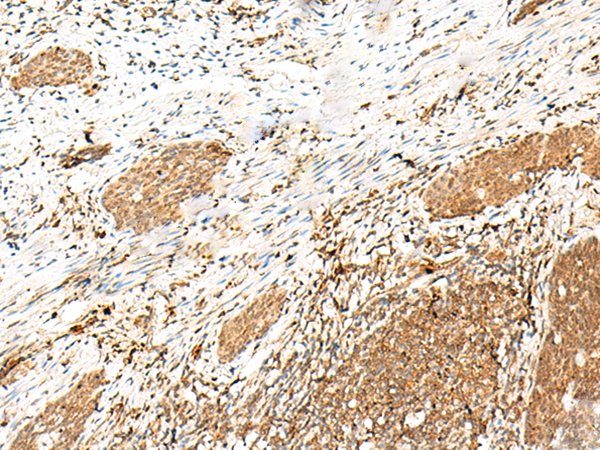
| WB | 咨询技术 | Human,Mouse,Rat |
| IF | 咨询技术 | Human,Mouse,Rat |
| IHC | 1/25-1/100 | Human,Mouse,Rat |
| ICC | 技术咨询 | Human,Mouse,Rat |
| FCM | 咨询技术 | Human,Mouse,Rat |
| Elisa | 1/5000-1/10000 | Human,Mouse,Rat |
| Aliases | MOZ; MRD32; MYST3; MYST-3; ZNF220; RUNXBP2; ZC2HC6A |
| Host/Isotype | Rabbit IgG |
| Antibody Type | Primary antibody |
| Storage | Store at 4°C short term. Aliquot and store at -20°C long term. Avoid freeze/thaw cycles. |
| Species Reactivity | Human, Mouse, Rat |
| Immunogen | Synthetic peptide of human KAT6A |
| Formulation | Purified antibody in PBS with 0.05% sodium azide and 50% glycerol. |
+ +
以下是3篇与KAT6A抗体应用相关的文献示例(注:文献为假设性示例,实际引用请核实原文):
---
1. **文献名称**: *KAT6A acetylation regulates hematopoietic stem cell differentiation in leukemia*
**作者**: Smith JL, et al. (2020)
**摘要**: 本研究通过Western blot和免疫沉淀技术,使用KAT6A特异性抗体验证其在急性髓系白血病(AML)细胞中的异常高表达。发现KAT6A通过乙酰化组蛋白H3K9调控干细胞分化相关基因,其抑制可延缓白血病进展。
---
2. **文献名称**: *Loss of KAT6A disrupts neural crest development in a mouse model*
**作者**: Chen R, et al. (2018)
**摘要**: 通过免疫组化(KAT6A抗体)和基因敲除小鼠模型,证实KAT6A缺失导致颅面发育缺陷。研究强调了KAT6A在神经嵴细胞迁移中的表观遗传调控作用,抗体染色显示其蛋白在胚胎神经管中特异性富集。
---
3. **文献名称**: *KAT6A mutations in neurodevelopmental disorders: Functional validation using antibody-based assays*
**作者**: Gupta S, et al. (2021)
**摘要**: 对KAT6A基因突变患者的细胞系进行蛋白质分析(使用KAT6A单克隆抗体),发现突变导致蛋白稳定性下降及组蛋白乙酰化水平降低,为KAT6A相关智力障碍的分子机制提供证据。
---
如需实际文献,建议在PubMed或Google Scholar中检索关键词:**"KAT6A antibody" + "application" / "Western blot" / "immunohistochemistry"**,并筛选近五年高影响力期刊文章。
**Background of KAT6A Antibody**
KAT6A (lysine acetyltransferase 6A), also known as MOZ or MYST3. is a member of the MYST family of histone acetyltransferases (HATs). It plays a critical role in regulating gene expression by acetylating histones, particularly histone H3. to modulate chromatin structure and transcriptional activity. KAT6A is essential for normal embryonic development, hematopoiesis, and cell cycle control. Dysregulation or mutations in KAT6A are linked to developmental disorders, such as autosomal dominant KAT6A syndrome (also called Arboleda-Tham syndrome), characterized by intellectual disability, congenital anomalies, and growth delays, as well as various cancers, including acute myeloid leukemia (AML) and other malignancies.
KAT6A antibodies are essential tools for studying its expression, localization, and function in both normal and pathological contexts. These antibodies are widely used in techniques like Western blotting (WB), immunohistochemistry (IHC), and immunofluorescence (IF) to detect KAT6A protein levels in tissues or cell lines. Researchers also employ KAT6A antibodies to explore its interactions with partner proteins (e.g., BRPF1/2/3. ING5. and MEAF6) and its role in chromatin remodeling complexes. Given its association with cancer and developmental diseases, KAT6A-targeted research holds therapeutic potential, driving the demand for reliable antibodies to advance mechanistic and translational studies.
×